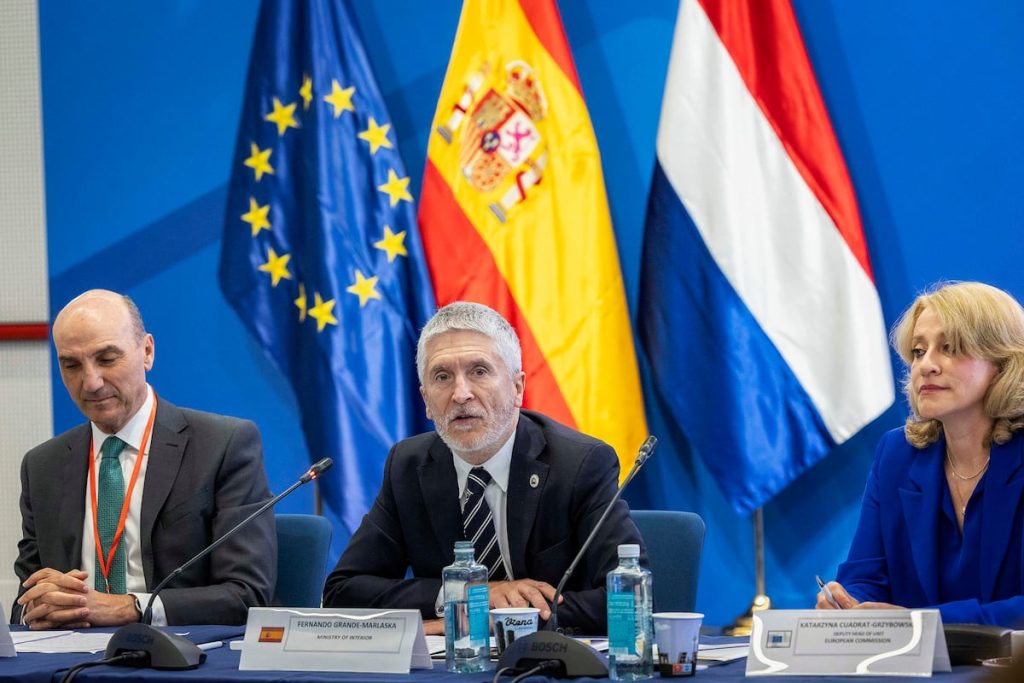The fight against terrorism is also being waged on the internet. The Center for Intelligence against Terrorism and Organized Crime (CITCO, under the Ministry of the Interior) promoted the elimination of over 3,000 web pages last year containing videos, photos, text documents, and profiles promoting terrorism, nearly 60% of all requests made in the European Union (EU), as reported by the Ministry of the Interior on Thursday. Of these, nearly 80% were related to radical jihadist content, but police experts highlight a significant increase in far-right ideology propaganda, which now accounts for almost 20% of the total. Content related to anarchist or extreme left-wing ideologies is far behind, according to these sources.
Interior has organized a conference in Madrid, starting on Thursday at the Technological Security Center (CETSE), to promote international collaboration in this field. Experts in cybersecurity from 24 EU countries are participating for two days. Since June 2022, the European Union has had regulations in place to combat the spread of radical propaganda on the internet. Minister Fernando Grande-Marlaska, who inaugurated the conference, emphasized the need for “meticulous surveillance and coordinated action to protect European citizens and the rule of law in cyberspace.” Interior highlights that in April 2023, Spain was the first European country to request the removal of terrorist materials after discovering a jihadist propaganda video in a freely accessible digital library online.
Three months later, Interior began using Perci, a computer tool designed by the European Union Agency for Law Enforcement Cooperation (Europol) to expedite requests made by states to technology companies to immediately remove criminal content from their platforms and databases without the need for a court order. Until December 31, six EU countries had issued 349 of these removal orders targeting platforms such as Telegram, Meta, Justpaste.it, TikTok, among others. For example, Perci allowed for the coordination of an operation with other European countries on December 18, detecting 827 web pages containing instructional materials and manuals used by terrorists, mostly of jihadist ideology, and notifying these companies to block them to prevent them from going viral.
Police sources highlight that the invasion of Gaza by Israel following Hamas’ terrorist attacks on October 7 has been instrumentalized by jihadists to increase their internet propaganda. Not the only trend detected in recent months. These sources also point out that a significant amount of this jihadist content is targeting vulnerable groups, such as minors, whom they are trying to recruit on online gaming platforms and social networks. There have even been jihadist versions of war games like the popular Call of Duty. Data from the Elcano Royal Institute indicates that those who began their radicalization when they were minors increased from 17.1% of those convicted or deceased in Spain between 2001 and 2011 to 23.4% between 2012 and 2023. Last year, eight minors were arrested in Spain for jihadist activities.
During his speech at the conference opening, Grande-Marlaska highlighted Spain’s “pioneering” role in executing orders for the removal of radical online content. “In recent years, we have intensified our efforts with the creation of the National Unit for the Removal of Terrorist Content, whose specialization facilitates and coordinates the active participation of all relevant actors in cleaning our network of terrorist messages and demonstrating our adaptability and responsiveness,” he pointed out. The minister also emphasized the importance of “swift intervention” to halt the spread of radical messages.


